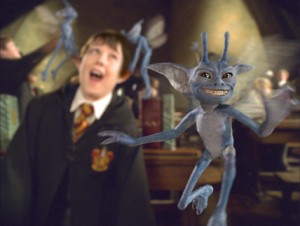
The pixies from “Harry Potter and the Chamber of Secrets”, shown here in the movie, are also featured in the book “Fantastic Beasts”, so audience members can expect to run into them in the upcoming “Fantastic Beasts” trilogy.
Around 15 years ago, the Harry Potter craze hit America and the world. This series of books and movies about an English boy admitted into Hogwarts, a school for witchcraft and wizardry, captured the imaginations of countless children, teenagers and adults. Shortly after its publication, sci-fi/fantasy became an acceptable and respected genre in mainstream society almost overnight. When a new Harry Potter book or movie came out, people dressed in wizard robes and sporting magic wands flocked in lines to read/see it first. The lasting influence that this series of books and movies had on pop culture and media as a whole is undeniable. However, back when the final Harry Potter book was released in 2007, author JK Rowling insisted that she was done with the series, and wouldn’t be writing any more fantasy-related works. But it looks like the media isn’t done with the Harry Potter universe just yet.
Back in September, Warner Brothers, who owns the rights to the Harry Potter films, announced that they planned to release a Harry Potter spinoff trilogy, based off of “Fantastic Beasts and Where to Find Them”, one of three supplement books written for the Harry Potter series. Rowling wrote the 54-page book in 2001 between the publication of the fourth and fifth Harry Potter books. As the name implies, “Fantastic Beasts” is about the different magical creatures that populate the Harry Potter universe. Warners Bros. has just announced an official release date for the first installment of this trilogy: November 18th, 2016.
Last year, Warner Bros. CEO Kevin Tsujihara persuaded Rowling to adapt the book into a screenplay. Initially set in New York City about 70 years before the start of the Harry Potter story, the films will follow “magizoologist” Newt Scamander in his search and study of magical creatures around the world. Tsujihara indicated that the trilogy would become a part of Warner Bros.’ massive merchandising efforts. Between 2001 and 2011, Warner Bros.’ eight Harry Potter films grossed $7.7 billion, and spawned countless more dollars in the forms of toys, sponsorship deals and theme parks. Considering how Tsujihara indicated that the film series would later be included into the Harry Potter theme parks in Universal Studios, it seems likely that Warner Bros. is looking to make as much money off of the series as they can.